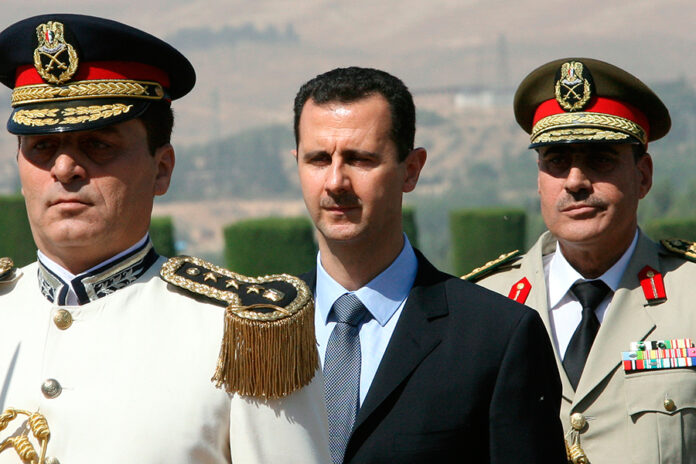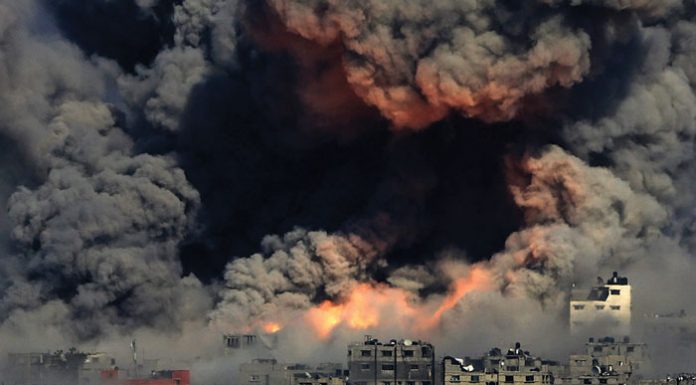There are times when bygones should be allowed to be bygones.
But when what has gone by was a tyrant’s ruthless torture and murder of hundreds of thousands of his countrymen, it’s not one of those times.
If the name Bashar al-Assad came to your mind just now, you’re on the ball.
Mr. al-Assad, of course, is the strongman who has served as Syria’s president for more than two decades and who presided over the aforementioned tortures and murders.
They began in earnest in 2011, when the Syrian leader ordered a violent crackdown on protesters of his regime, leading to what became, and continues as, a civil war.
Mr. al-Assad has used up countless bullets but has also favored killing his country’s difficult pro-democracy citizens (and, collaterally, their apolitical neighbors) with chemicals. Like his attack in 2013 on the Damascus suburb of Ghouta, which resulted in the agonized deaths of more than 1,000 men, women and children; and his 2017 nerve gas attack on the town of Khan Shaykhun; and his 2018 chemical attack on the city of Douma. Scores perished in those latter murder sprees, according to a joint investigation of the Organisation for the Prohibition of Chemical Weapons and a UN commission.
Over the course of the Syrian civil war to date, more than 300,000 civilians have been killed and more than 100,000 detained or “disappeared,” according to the UN. Nearly half of the Syrian pre-war population of 21 million has been displaced, either within Syria or as refugees abroad.
The Assad regime has been shunned for its crimes against humanity over the past decade not only by Western nations but also by the Arab League, a conglomeration of 22 Arab countries, including Egypt, Iraq, Jordan, Saudi Arabia, Sudan and Yemen.
The League trumpets pan-Arab unity rhetoric but is in fact designed to help ensure each member country’s leader’s concern for his personal survival. Its expulsion of Syria in 2011 was a rare act of unified outrage and courage on the part of the body.
But its outrage has apparently waned and its courage dissipated, since the Syrian dictator was recently invited by his fellow strongmen to rejoin the group.
It wasn’t pure apathy and cowardice that motivated the League’s change of heart on Syria. A major—perhaps the major—factor in the group’s embrace of the once-pariah state is a drug called Captagon.
Relatively (and blessedly) unknown outside the Middle East, the powerful and addictive amphetamine, which was developed to treat attention deficit disorder and narcolepsy, is very popular as a “recreational” drug in many Arab countries. According to the UN Office on Drugs and Crime, Captagon is the most popular abused drug in the Arabian peninsula.
Although Damascus denies any involvement in the Captagon trade, knowledgeable observers say that production and smuggling of the drug have brought in billions of dollars for Mr. al-Assad and his associates.
The New Lines Institute for Strategy and Policy, a nonpartisan Washington-based foreign policy think tank, describes the Syrian government’s use of “local alliance structures…for technical and logistical support in Captagon production and trafficking.” Prime among those “alliance structures,” it discovered, are Hezbollah and other Iranian-backed militias.
Concern about increasing Captagon addiction and fear of the political instability it could foster have impelled countries that have seen large amounts of Captagon cross their borders to try to stem the flow of the drug from Syria. But success has eluded them.
And so, by welcoming Syria back into its ranks, the Arab League may be hoping that some sort of quid pro quo can be obtained from Syria, in the form of its getting out of the Captagon business and finding some other illicit source of funds.
“In other news,” as the broadcasters like to say, Mr. al-Assad visited Russia a few weeks back and met with Russian President Vladimir Putin. Afterward, the Syrian defended Russia’s “special military operation” in Ukraine to fight “neo-Nazis and old Nazis,” and officially recognized the Russian annexation of four Ukrainian oblasts. He also called on Russia to expand its military presence in Syria.
Syria, Iran, Hezbollah, Russia. A four-way match not made in heaven.
To read more, subscribe to Ami





















